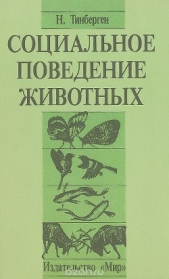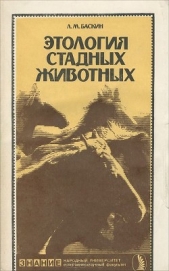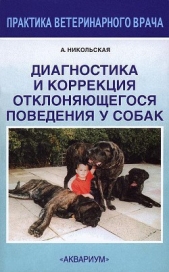Сравнительный анализ различных форм социального обучения у животных

Сравнительный анализ различных форм социального обучения у животных читать книгу онлайн
Внимание! Книга может содержать контент только для совершеннолетних. Для несовершеннолетних чтение данного контента СТРОГО ЗАПРЕЩЕНО! Если в книге присутствует наличие пропаганды ЛГБТ и другого, запрещенного контента - просьба написать на почту [email protected] для удаления материала
Galef, B.G., Jr., 1988. Imitation in animals: history, definition and interpretation of data from psychological laboratory // Comparative social learning. / Eds. Zentall T., Galef B.G., Jr., Hillsdale. New Jersey: Erlbaum. P. 3—28.
Galef B.G., Jr., 1992. The question of animal culture // Human Nature. N 3. P. 157—178.
Galef B.G., Jr., Giraldeau L.A., 2001. Social influence on foraging in vertebrates: causal mechanisms and adaptive functions // Anim. Behav. V. 61. P. 3—15.
Hessing M.J.C., Hagels A.M., Beek J.A.M., van, Wiepkema P.R., Schouten W.P.G., 1994. Individual behavioral and physiological strategies in pigs // Physiol. Behav. V. 55. P. 39—46.
Heyes C.M., 1994. Social learning in animals: categories and mechanisms // Biol. Rev. V. 69. P. 207—231.
Hinde R.A., Fisher J., 1951. Further observations on the opening of milk bottles by birds // British Birds. V. 44. P. 393—396.
Huber L., Rechberger S., Taborsky M., 2001. Social learning affects object exploration and manipulation on keas, Nestor notabilis // Anim. Behav. V. 62. P. 945—954.
Huffman M.A., Nishie H., 2001. Stone handling, a two decade old behavioural tradition in a Japanese monkey troop // Advances in Ethology. V. 36. P. 35—36.
Kawamura S, 1963. The process of sub — culture propagation among Japanese Macaques // Primate Social Behaviour / Ed. Southwick C.H. N.Y.: Van Nostrand. P. 82—90.
Kawai M., 1965. Newly-acquired Pre-Cultural Behavior of the Natural Troop of Japanese Monkeys on Koshima Islet // Primates.V. 6. N. 1. P. 1—30.
Köhler W., 1925. The Mentality of Apes. L.: Routledge and Kegan Paul. Reprint in N.Y.: Liverigh. 1976. 350 p.
Koolhaas J.M., Korte S.M., De Boer S.F., Van Der Vegt B.J., Van Reenen C.G., Hopster H., De Jong I.C., Ruis M.A.W., Blokhius H.J., 1999. Copying styles in animals: current status in behaviour and stress — physiology // Neuroscience and Behavioural Reviews. V. 23. P. 925—935.
Krebs J.R., Davies N.B. (eds), 1978. Behavioural Ecology. An Evolutionary Approach. Oxford: Blackwell Scientific Publications. 482 p.
Laland K.N., Plotkin H.C., 1992. Further experimental analythis of the social learning and transmission of foraging information amongst Norway rats // Behav. Proc. V. 27. P. 53—64.
Lefebvre L., Whittle P., Lascaris E., Finkelstein A., 1997. Feeding innovation and forebrain size in birds // Anim. Behav. V. 53. P. 549—560.
Lopez G.C., Lopez D., 1985. Killer whales (Orinus orca) of Patagonia, and their behavior of intentional stranding while hunting near shore // J. Mammal. V. 66. P. 181—183.
Mason R.J., 1988. Direct and observational learning by redwinged blackbirds (Agelaius phoeniceus): the importance of complex visual stimuli // Social Learning: Psychological and Biological Perspectives / Eds. Zentall T.R., Galef, B.G., Jr. Hillsdale. New Jersey: Lawrence Erlbaum. P. 99—115.
McElroy H., 1974. Desert Hawking. Tuscon: Cactus Press. 216 p.
McGrew W.C., 1992. Chimpanzee material culture: Implications for Human Evolution. Cambridge: Cambridge Univ. Press. 277 p.
McGrew, W.C., 1998. Culture in non-human primates? // Ann. Rev. of Anthropology. V. 34. P. 97—115.
McGrew W.C., 2001. The Other Faunivory. Primate Insectivory and Early Human Diet // Meat Eating and Human Evolution./ Eds. Graig B., Stanford H., Bonn T. Oxford: Oxford Univ. Press. P. 160—177.
Meinertzhagen R., 1954. The education of young ospreys // Ibid. V. 96. P. 153—155.
Midford P.E., Hailman J.P., Woolfeden G.E., 2000. Social learning of a novel foraging patch in families of free-living Florida scrub-jays // Anim. Behav. V. 59. P. 1199—1207.
Mineka S., Cook M., 1988. Social learning and the acquisition of snake fear in monkeys// Comparative social learning / Eds. Zentall T., Galef B.G., Jr… Hillsdale, New Jersey: Erlbaum. P. 51—73.
Nagell K., Olguin R. S., Tomasello M., 1993. Process of Social Learning in the Tool Use of Chimpanzees (Pan troglodytes) and Human Children (Homo sapiens) // J. of Comp. Psychol. V. 107. P. 174—186.
Newton I., 1979. Population Ecology of Raptors. Vermillion, South Dakota: Buteo Books. 399 p.
Noble J., Tuci E., Todd P.M., 1999. Social learning and information sharing: an evolutionary simulation model of foraging in Norway rats // Proceedings of the Fifth European Conference on Artificial Life (ECAL'99) / Eds. Floreano D., Mondada F., Nicoud, J. — D. Berlin: Springer Verlag. P. 514—523.
Oldfild-Box H., 1970. Comments of two prelimibary studies of «observation» learning in the rats // J. Comp. Psychol. V. 116. N 1. P. 125—128.
Pfeffer K., Fritz J., Kotrschall K., 2002. Hormonal correlates of being an innovative greylag goose, Anser anser // Anim. Behav. V. 63. P. 687—695.
Previde E.P., Poli M.D., 1996. Social learning in the golden hamster // J. Comp. Psychol. V. 110. P. 203—208.
Reader S.M., Laland K.N., 2000. Diffusion of foraging innovation in the guppy // Anim. Behav. V. 60. P. 175—180.
Reznikova J., 1982. Interspecific communication between ants // Behaviour. V. 80. P. 84—95.
Reznikova Zh., 2001. Interspecific and intraspecific social learning in ants // Advances in Ethology. V. 36. Blackwell Sciences. P. 108—109.
Rozin P., Kalat J.W., 1971. Specific hungers and poisoning as poisoning as adaptive specializations of learning // Psychol. Review. V. 78. P. 459—486.
Ryabko B.Ya., Reznikova Zh.I., 1996. Using Shannon Entropy and Kolmogorov Complexity to study the communicative system and cognitive capacities in ants // Complexity. V. 2. N 2. P. 37—42.
Schaadt C.P., Rymon L.M., 1984. Innate fishing behavior of ospreys // Raptor Res. V. 16. P. 61—62.
Sherry D.F., Galef B.G., Jr., 1984. Cultural transmission without imitation: milk bottle opening by birds // Anim. Behav. V. 32. P. 937—938.
Sherry D.F., Galef B.G., Jr., 1990. Social learning without imitation: More about milk bottle opening by birds // Anim. Behav. V. 40. P. 987—989.
Sherwin C.M., Heyes C.M., Nicol C.J., 2002. Social learning influences the preference of domestic hens for novel food // Anim. Behav. V. 63. P. 933—942.
Spence, K.W., 1937. Experimental studies of learning and higher mental processes in infra-human primates // Psychological Bulletin. V. 34. P. 806—850.
Suboski M.D., Bartashunas C., 1984. Mechanisms for social transmission of pecking preference to neonatal chicks // J. Exp. Psychol. V. 10. P. 182—194.
Thorndike E.L., 1911. Animal Intelligence. N.Y.: Macmillan. 560 p.
Thorpe W.H., 1956. Learning and Instinct in Animals. Cambridge: Harvard Univ. Press. 494 p.
Tomasello M., 1990. Cultural transmission in the tool use and communicatory signalling of chimpanzees? // «Language» and Intelligence in Monkeys and Apes / Ed. Parker S.T., Gibson K.R. Cambridge: Cambridge Univ. Press. P. 274—311.
Tomasello M., 1996. Do Apes Ape? // Social Learning in Animals: The Roots of Culture / Eds. Heyes C.M., Galef B.G., Jr. N.Y.: Academic Press, Inc… P. 319—346.
Valsecehi P., Mainardi M., Mainardi D., 1989. On the role of the demonstrator of the solution of a problem in the house mouse // Ethology, Ecology and Evolution. V. 1. N 1. P. 213—216.
Verbeek M.E.M., Drent P.J., Wiepkema P.R., 1994. Consistent individual differences in early exploratory behaviour of male great tits // Anim. Behav. V. 48. P. 1113—1121.
Visalberghi E., Adessi E., 2000. Seeing group members eating a familiar food enhances the acceptance of novel foods in capuchin monkeys // Anim. Behav. V. 60. P. 69—76.
Visalberghi E., Fragaszy D., 1990. Do monkeys ape? // «Language» and intelligence in monkeys and apes / Eds. Parker S.T., Gibson K.R. Cambridge: Cambridge Univ. Press. P. 247—273.
Voelkl B, Huber L., 2000. True imitation in marmosets // Anim. Behav. V. 60. P. 195—202.
Whiten A., 1998. Imitation of the sequential structure of actions by chimpanzees (Pan troglodytes) // J. Comp. Psychol. V 112. P. 270—281.
























